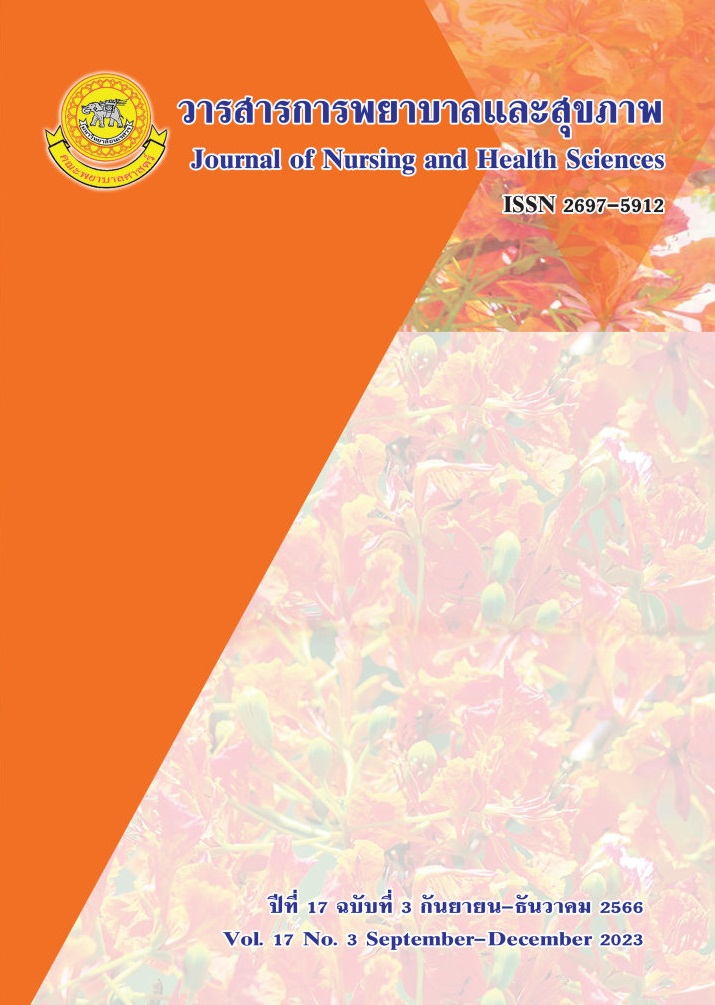การประยุกต์ใช้แนวคิดความรอบรู้ด้านสุขภาพในกระบวนการพยาบาลเพื่อการพัฒนาสุขภาพที่ยั่งยืน
Main Article Content
บทคัดย่อ
ความรอบรู้ด้านสุขภาพเป็นแนวคิดที่เป็นมุ่งเน้นการพัฒนาบุคคลให้มีความรู้ ความเข้าใจในประเด็นสุขภาพโดยสามารถวิเคราะห์ตัดสินใจกำหนดทางเลือกที่เหมาะสมได้ โดยกำหนดเป้าหมายการปรับพฤติกรรมสุขภาพของตนเอง อีกทั้งยังสามารถชี้แนะแนวทางการปรับเปลี่ยนพฤติกรรมที่ถูกต้องให้กับบุคคลอื่น วัตถุประสงค์ของการเขียนบทความฉบับนี้เพื่อให้พยาบาลวิชาชีพเข้าใจแนวคิดความรอบรู้ด้านสุขภาพ องค์ประกอบและระดับของความรอบรู้ด้านสุขภาพ ความสัมพันธ์ระหว่างความรอบรู้ด้านสุขภาพกับการสร้างเสริมสุขภาพ พยาบาลวิชาชีพซึ่งเป็นกำลังสำคัญที่จะช่วยขับเคลื่อนนโยบายด้านสาธารณสุขและพัฒนาให้บุคคลมีความรอบรู้ด้านสุขภาพจนสามารถพึ่งตนเองได้ การประยุกต์ใช้แนวคิดความรอบรู้ด้านสุขภาพในกระบวนการพยาบาลนั้น จะต้องค้นหาปัญหาและความต้องการโดยนำปัญหาที่ได้จากการประเมินมาวางแผนแก้ไขอย่างเป็นระบบร่วมกับการใช้สื่อและกลวิธีที่เหมาะสม จนนำไปสู่การปฏิบัติและติดตามผลลัพธ์ที่มีความต่อเนื่องและเป็นพลวัติ แนวคิดความรอบรู้ด้านสุขภาพสามารถนำไปประยุกต์ใช้ได้ทั้งในระดับบุคคล ครอบครัว ชุมชน แต่อาจมีความต่างกันซึ่งในระดับครอบครัวและชุมชนต้องปรับเปลี่ยนกิจกรรมหรือช่วงเวลาให้สอดคล้องตามบริบทวิถีการดำเนินชีวิต อีกทั้งจะต้องอาศัยการมีส่วนร่วมของชุมชนและภาคีเครือข่ายในการร่วมกันแก้ไขปัญหาและวางแผนพัฒนาจนเกิดเป็นชุมชนรอบรู้ ทั้งนี้ผู้นำทางการพยาบาลและพยาบาลวิชาชีพควรร่วมกันวางแผนและกำหนดหนดเป้าหมายในสร้างเสริมความรอบรู้ด้านสุขภาพโดยประยุกต์ใช้กระบวนการพยาบาลเพื่อเป้าหมายการพัฒนาสุขภาพอย่างยั่งยืน
Article Details

อนุญาตภายใต้เงื่อนไข Creative Commons Attribution-NonCommercial-NoDerivatives 4.0 International License.
เอกสารอ้างอิง
Chang, L. (2011). Health literacy, self reported status and health promotion behaviors for adolescents in Taiwan. Journal of Clinical Nursing, 20, 190-196.
De Walt, D., Berkman, N., Sheridan, S., Lohr. K.,& Pignone, M. (2004). Literacy and health outcomes. Journal of General International Medicine, 19, 1228-1239.
Health education Division, Ministry of Public Health.(2011). Health literacy. Bangkok: New Thammada printing. [In Thai].
Health education Division, Ministry of Public Health.(2013). Health literacy. Bangkok: Printing house of the Agricultural cooperatives association of Thailand. [In Thai].
Intarakamhang, U. (2021). Creating and developing of Thailand health literacy scales. Bangkok:Health Education Division; [In Thai].
Jangpakdee, S., Prasertsong, CH., & Kasiphol, T.(2022). The effects of health literacy program on Covid-19 prevention behaviors Type 2 diabetes mellitus patient. Journal of the Royal Thai Army Nurse,23(3), 333-341. [In Thai].
Kaewdumkerng, K. (2021). Health literacy processes practices and evaluation tools. Bangkok: ID All Digital Print. [In Thai].
Kickbusch, I., Pelikan, J.M., Apfel, F. & Tsouros, A.D.(2013). Health literacy. The solid facts. World Health Organization, Regional office for Europe. The European Health Literacy Project 2009-2012, 21-35.
Kompayak, J., & Durongritchai, W. (2011). Community health nursing: concepts, principles and nursing practices (2nd ed.). Bangkok: Jutthong.[In Thai].
Mancuso, JM. (2009). Assessment and measurement of health literacy: an integrative review of the literature. Nursing & Health Science, 11, 77-89.
Michou, M., Panagiotakos, DB., & Costarelli, V. (2018).Low health literacy and excess body weight:a systematic review. Cent Eur J Public Health,26(3), 234-241.
National Health Development Plan Steering Committee,Ministry of Public Health. (2016). National health development plan No. 12. Bangkok:Ministry of Public Health. [In Thai].
National Strategic Map for 20 years (2018-2037).(2017). Government gazette, Volume 135,Chapter 82 Kor (Dated 13th 2018).Nutbeam, D. (2008). The evolving concept of health literacy. Social Science & Medicine, 67(12),2072-8.
Photihung, P.(2021). Relationship of health literacy to health promoting and disease prevention behaviors in Thailand: A systematic review.The Journal of Faculty of Nursing Burapha University, 29(3), 115-130. [In Thai].
Pengchan, W., (2017). Health literacy. Capacity development workshop documents. Personnel of the Department of Healthregarding health literacy towards Thailand. [In Thai].
Piamsiri, O., Neelapaichit, N., & Kaveevivitchai C.(2018). Relationships of selectedfactors, health literacy and clinical outcomes in community dwellers withhypertension. The Bangkok Medical Journal, 14(2). [In Thai].
Public Health Systems Research Institute. (1998).Definition of health promotion terminology (2nd ed.). Bangkok: Design Company Limited.[In Thai].
Rothman, RL., Housam, R., Weiss, H., Davis, D.,Gregory, R., Gebretsadik, T., … Elasy, TA.(2006). Patient understanding of food labels:the role of literacy and numeracy. American journal of preventive medicine, 31(5), 391-398.
Sharif, I., & Blank, A.E. (2010). Relationship between child health literacy and body mass index in overweight children. Patient Education and Counseling, 79(1), 43-48.
Strategy and Planning Division, Office of the Permanent Secretary Ministry of Public. (2016). Health document of SDGs: sustainable development goals: preparationto SDG, [In Thai].
Strategy and Planning Division, Ministry of Public Health. (2017). Twenty-year national strategic plan for public health (2017-2036) (2nd rev.).Nonthaburi: Ministry of Public Health. [In Thai].
Thiplert,A. (2007). Self-awareness, media literacy: a new concept of media literacy for health. Bangkok:Mr.Copy. [In Thai].
World Health Organization. (1998). Health promotion glossary. Gennevar: WHO Publication.
World Health Organization. (2009). Concepts and examples in the Eastern Mediterranean Region. Individual Empowerment Conference Working Document. 7th Global Conference on Health Promotion Promoting Health and Development. Nairobi, Kenya.
World Health Organization. (2016). Shanghai Declaration. Retrieved March 15, 2023, from http://www.who.int/healthpromotion/conferences/9gchp/shanghai-declaration/en/
Yong-Bing Liu, Liu Liu, Yan-Fei Li & Yan-Li Chen. (2015). Relationship between health literacy, health-related behaviors and health status: A survey of elderly Chinese. International Journal of Environmental Research and Public Healtth, 12, 9714-25.


